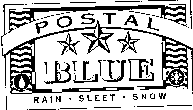Seattle Weather Calls to Mind the U.S. Postal Service's Registered Trademarks
Its motto was tested yesterday.
Yes, Seattle’s famous for rain, but when we get snow, this hilly town shuts down.
True to its word, the post office nonetheless got the mail through. Mostly bills and junk mail, but I suppose it can’t be blamed for that.
This got me thinking about its famous slogan: “Neither snow, nor rain, nor heat, nor gloom of night stays these couriers from the swift completion of their appointed rounds.”
Interestingly, the Smithsonian’s National Postal Museum says this isn’t the Postal Service’s official motto after all. It says these words merely come from an inscription the architects engraved as a decorative flourish on the James A. Farley Post Office building they designed at 8th Avenue and 33rd Street in New York City. The words are attributed to Herodotus, who was describing (of course) not the U.S. postal system but that of 500 B.C. Persia.


So if this isn’t the official U.S. Postal Service motto, why does the U.S. Postal Service own two registrations incorporating those words? Trademark Registration Nos. 2204875 and 2630271 are both design marks containing the words “RAIN SLEET SNOW.”
There notably are no other trademark registrations incorporating those famous words — except in their generic sense. The Pennzoil-Quaker State Company owns Reg. No. 3258361 for ULTIMATE VISIBILITY IN RAIN, SLEET AND SNOW! for “windshield wipers and blades thereof.”
The application to register NEITHER RAIN NOR SLEET NOR SNOW WILL KEEP ME FROM MY BINGO/KENO was abandoned, though the Las Vegas-based owner filed it five years before the U.S. Postal Services filed its applications.
Official or not, the U.S. Postal Service has a nice slogan going for it.
And if you ask me, it’s official. The Smithsonian is pretty darned authoritative, I’ll grant you that. But in my book, the Postal Service’s trademark registrations speak for themselves.
Nintendo Settles Trademark Suit Over "Nunchuck" Game Controller
Redmond, Wash.-based Nintendo of America, Inc., settled its trademark and design patent suit today against Los Angeles-based Nyko Technologies, Inc.
The Western District suit stemmed from Nyko’s “Wireless Nunchuck” game controller (later called “Kama Wireless Nunchuck”) used with Nintendo’s Wii video game console. Nintendo claimed Nyko’s use of NUNCHUCK infringed Nintendo’s use of its own NUNCHUCK registered trademark, which Nintendo also uses in connection with video game controllers.
Nintendo claimed a priority date of November 2006 and that Nyko first used its mark in May 2008.
Nyko counterclaimed for a declaration of noninfringement.
The parties had motions pending at the time they settled. Nintendo had moved for a preliminary injunction. Nyko had moved for summary judgment dismissing Nintendo’s claims for lack of standing.
Terms of the settlement are not public, except for their mutual dismissal of all claims and counterclaims. However, one report states Nyko can continue selling a redesigned version of its controller. A review of Nyko’s Web site also suggests that Nyko has dropped references to “Nunchuck” and that it now calls its controller the “Kama Wireless Controller.”
The case cite is Nintendo of America Inc. v. Nyko Technologies, Inc., No. 08-907 (W.D. Wash.).
Microsoft Appears to Leapfrog Competing ITU Application for Search Engine Mark
On Dec. 2, I talked about how cool it was that local tech bloggers investigated WHOIS and PTO databases to learn more about Microsoft’s apparent intent to adopt KUMO as its new search engine brand.
One snag that TechFlash blogger Todd Bishop pointed out was on Aug. 8, someone in Venezuela filed an intent-to-use application for KUMO, also in connection with search engines. The applicant did not seem to be connected to Microsoft, raising the question of how (and whether) the filer knew that Microsoft sought to use KUMO as its own search engine brand.
Last week, the story took an interesting turn. On Dec. 4, Microsoft filed an intent-to-use application for KUMO for search engines. Its doing so seems to dispel any connection with the gentleman from Venezuela. But even more interesting, it’s a Section 44(d) application that’s supported by a June 18 filing in South Africa.
So, in the priority race… Microsoft wins!
Assuming its South African application matures to registration, the PTO will give Microsoft’s U.S. application the benefit of its June 18 South African filing date, which beats the Venezuelan gentleman’s filing by almost one month. Since the marks are identical and the services are nearly identical, the PTO will likely grant Microsoft’s application and deny the Venezuelan’s on likelihood of confusion grounds. Touché!
I hadn’t considered this, but this strategy makes good, sneaky sense. If you’re a big company working on a secret worldwide re-branding effort, file your first application somewhere a little off-the-radar. Section 44(d) enables you to take advantage of that filing date in the U.S. as long as you file your U.S. application within six months and your goods and services description is the same. With this strategy, you can leapfrog back in time over would-be copycat filers. Neat!
TechFlash wrote about this development yesterday in a follow-up post.
The Bare Facts about Naked Licensing
This morning I spoke at the Washington State Bar Association’s CLE on “Licensing Essentials.” (STL preview here.) I focused on naked licensing. Here are my slides. (Note that some formatting was altered during the upload).
Ninth Circuit Affirms Renoir-Guino False Advertising Decision
 The Ninth Circuit Dec. 9 affirmed the jury’s verdict and the District of Arizona’s findings in favor of the defendants/counterclaim plaintiffs in the false advertising portion of Societe Civile Succession Richard Guino v. Renoir. The claim involved the alleged marketing of copied statutes as originals.
The Ninth Circuit Dec. 9 affirmed the jury’s verdict and the District of Arizona’s findings in favor of the defendants/counterclaim plaintiffs in the false advertising portion of Societe Civile Succession Richard Guino v. Renoir. The claim involved the alleged marketing of copied statutes as originals.
The Ninth Circuit found the jury had substantial evidence, “including an online advertisement for an exhibition of the Guino reproductions and testimony for Societe members regarding the promotion of the Guino reproductions at the exhibition,” to support its finding that the Societe “falsely advertised about its own or another’s product.”
The court also found that the district court had properly crafted its injunction against Societe. “To prevent the Guino reproductions from being held out to the public as original works (as Societe had done), the district court properly fashioned an injunction that required these works to be labeled as ‘unauthentic and/or unauthorized duplicates of original Renoir-Guino works.’ Notably, the district court limited the scope of relief Renoir requested by permitting the sale of these works as long as they were correctly labeled, an injunction that Societe described as ‘proper.’”
Finally, the court upheld the district court’s award of attorney’s fees to Renoir as the prevailing party in an exceptional case since the plaintiff waited until the last minute to dismiss a Lanham Act claim it was not able to establish. “Societe never tried to prove its Lanham Act claims against Renoir or [co-defendant] Beseder [Inc.] yet waited until trial to abandon them. It presented no evidence of confusion or damages, basic elements of any Lanham Act claim. Its claim was clearly groundless. Societe’s failure to dismiss its claim earlier in the proceeding once it knew that there was no evidence to support it was ‘unreasonable.’”
The opinion is kind of thin on the facts. The companion copyright infringement decision and Rebecca Tushnet’s 43(B)log fills in more background here and here.
The case cite is Societe Civile Succession Richard Guino v. Renoir, 2008 WL 5157719, Nos. 07-15582, 07-15583, 07-17209 (9th Cir. Dec. 9, 2008) (unpublished).